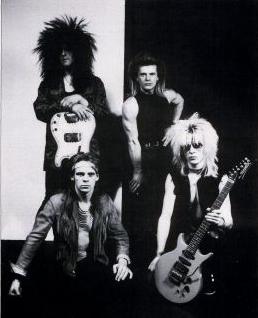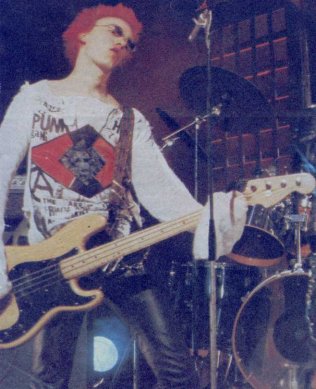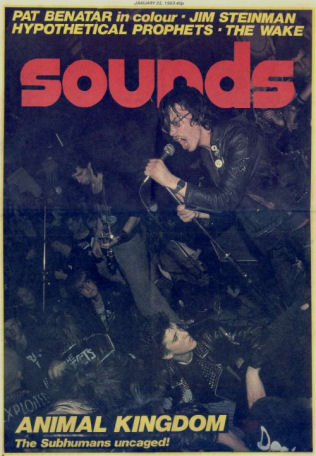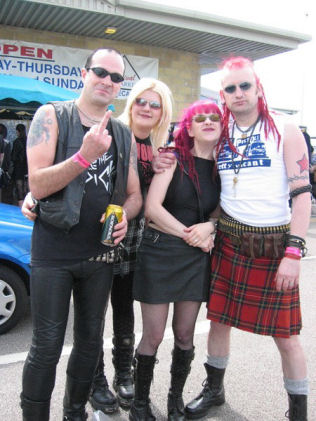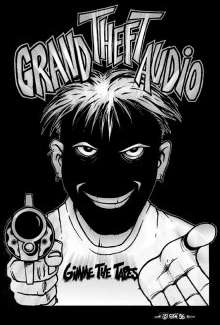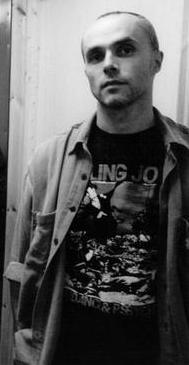IAN GLASPER
Label owner, band member, and now author, punk rock
renaissance man Ian Glasper has penned two superb
reads through Cherry Red Books chronicling early 80s UK
punk bands. "Burning Britain" covers what are referred to
as the "UK 82" groups such as Discharge, 4 Skins, GBH,
and so forth, while "The Day The Country Died" delves
into the anarcho side of things with bands like Crass,
Rubella Ballet, Omega Tribe, and Conflict. In his books
Ian has not only covered the "biggies" but also gone out of
his way to include numerous lesser knowns such as the
disgracefully mannered Stench, who went onto become
huge bankers.
Brian met up with Ian in a small Northern English town
(which was to Brian's great surprise both cold and damp) to discuss Ian's UK punk history writing compulsion.
Interview by Brian Sheklian
Brian: What made the bands in "Burning Britain" different from the ones in "The Day The Country Died" and how did you choose who would
be in what book ?
Ian: Well, I've tried to justify it in several ways - with the 'anarchy and chaos' bands in BB and the 'anarchy and peace' bands in TDTCD
being the most popular, haha! But if you just wanna call BB the 'studs 'n' leather' book, and TDTCD the 'black rags and plimsolls' book,
that's fine by me... it's a vague distinction at best, but if the two books had appeared as one volume, the project would have been quite
unmanageable, I think.
Brian: Do you think that one of the distinctions between the two camps is that the hardline anarcho bands were more about
doing-it-themselves and using less of the already established music business channels than the bands in Burning Britain ?
Ian: Absolutely! You never saw any of the anarcho bands on Top Of The Pops like you did
The Exploited, UK Subs and Cockney Rejects! Not to diss those bands for appearing or
anything, 'cos I can remember my excitement seeing them on TV, haha! You also never saw
anarcho bands in the pages of Sounds magazine with the same regularity as you did the
likes of Blitz and The Blood - although that was more to do with the hold Garry Bushell had
on their editorial, I think.
Brian: Just how important was it for bands to get featured in the pages of Sounds ? How
much sway did Sounds really have with the average underground or punk music listener?
Ian: Well, put it like this: if your demo was reviewed in there, you would sell a hundred
copies over the next fortnight! It was a bit of a bible for us here in the UK... especially if you
were a punk out in the countryside, with only local gigs to attend - you could look at the
listings for the 100 Club (London) or Adam 'N' Eves (Leeds) or Oddys (Oldham) and dream
about having that many great bands come through your town one day! Until I started picking
up MRR, it was certainly the only rag worth reading round these parts!
Brian: Many of the bands in "Burning Britain" ended up trying to make a career of playing
music while by and large the groups in "The Day The Country Died" could seem to care less
about making it as professional musicians. Do think that many of the "Burning Britain" bands
ended up compromising their music and beliefs in their quest for the almighty quid or do you
believe it was just musical growth on their parts? Do you believe that it is possible for a
band that has musically progressed to still play "punk" without going metal or "soft"?
Ian: You might have a point - there's really no justifying the 2nd Abrasive Wheels or Infa
Riot albums! Yet the rockier 2nd albums from the Anti-Nowhere League and Partisans
eally hit the spot for me... perhaps it's all down to personal taste...? I'm sure that Discharge
thought they were doing the right thing when they released 'Grave New World' too! It is
possible to 'stay punk' whilst progressing, I'm sure, but it's a fine tightrope to walk.
Brian: What exactly do you mean by the "right thing" ? The common reaction to that album
here in the States was of great disappointment. Members of the audience vented their
hostility over various issues with the band's new direction when they toured here to support
it. What was the reaction like to "Grave New World" at the time in the UK ? Just how big were
Discharge in the UK at the time?
Ian: Discharge were huge to my mind; although they weren't making the top of the
Independent Charts as much as the Anti-Nowhere League or The Exploited, they were
definitely up there with the big names... more importantly though, they had an integrity that
was lacking from those other bands, and 'Grave New World' destroyed that credibility. I think
the reaction here was the same as in the USA - the band were dead in the water within 6
months of the album hitting the shops. When I say the 'right thing', I mean that the band were
no doubt following their collective muse, and trying to make some relevant progress with
their music - as all musicians are usually keen to do - but it was a great shame that their
direction turned out to be plodding heavy metal! Especially after the impact their early
releases had on the world of extreme music - what a fall from grace!
Brian: Did many of the "system" hating anarcho musicians featured in your book "The Day
The Country Died" actually stick to their radical beliefs or did the majority grow up to become
corporate solicitors and bank presidents?
Ian: Having done all those interviews, I think the ex-members of the bands in TDTCD have
stayed more true to their punk roots than those of BB...generally speaking. Of course, there
are many exceptions to the rule, but even in just having an overall awareness of fair play, I
think the people that were in the so-called anarcho bands have grown up to be more
responsible people than those in the chaos punk bands... but like I said, there are many exceptions
to the rule, before anyone starts writing in to the webmaster! (I appreciate your concern Ian,
but nobody complains on this site to me directly. In fact I openly encourage any
feedback dissent or debate! - PDC)
Brian: Do you think that is down to a lot of the punks sharing very similar views but the anarcho
punks being more likely to put those views into action in daily life?
Ian: I'm not sure... it's a good theory. I suppose bands like Crass and Conflict demanded a certain
type of discipline, just to listen to their records, get to their gigs... the fact that 'outsiders' (not to
mention Steve Arrogant from Special Duties) regarded these bands as some sort of cult implies a
lot about how dedicated their followers were/appeared to be. Becoming a vegetarian took a great
deal more commitment than simply painting a band's name on the back of your leather jacket, didn't
it? I think a lot more of those kids went on to book their own shows and produce their own fanzines...
so quite possibly they carried that hands-on attitude into later life.
Brian: Do you ever go to any of the punk reunion festivals and throw stuff at the sad old men on stage who are trying desperately to prove
to the audience they've still got it? What bands do you reckon made the best comebacks? Do you think that some bands return with unreal
expectations of their popularity?
Ian: I do go along sometimes, and it's a mixed bag, to be honest, some bands still pulling it off effortlessly, others a sorry imitation of what
they once were. Some of the best reformed bands would have to be The Threats and the Soldier Dolls, who've both released cracking
new material rather than just rehashing hoary old chestnuts. And the Subhumans are better now than they've ever been - no mean feat,
'cos they've always been fucking brilliant anyway! I'm sure a lot of bands do have unreal expectations of their popularity, but if they can milk
tours of the US and Japan out of a few singles released in 1982, best of luck to them!
Brian: Have old punks been reduced to the same status as the people they used to criticise
for being behind the times and "outdated" ?
Ian: Yeah, to be honest, a lot of them have. It's interesting to go to some of these gigs and
listen to the young punks taking the piss out of the older punks in attendance... and similarly
the old campaigners stand there sneering at the young whippersnappers 'who weren't even
born when this or that band started playing out' etc etc. Really, who cares? There are some
tragic sights to behold - not least of all guys who have no hair left on top, and have to resort
to spiking their sideburns... mmm... 'Die With Dignity' by The Violators springs to mind!
Brian: You used to run Blackfish Records, what made you decide to give that up and focus
more on writing about punk instead of releasing it? Is writing about punk far less of a
financial burden that you can pretty much do at your own pace?
Ian: Blackfish was mainly a metalcore label, I guess, where I put stuff out by bands that I saw
opening for my old band Stampin' Ground... I used to sell an awful lot of the label's CDs
whilst on tour with SG too, and when I left that band, that's pretty much when I folded the
label... I wanted to quit whilst I was ahead basically! I'd done several releases that lost me a
load of money, and the label's bank account was looking a bit sick... I'd already pumped
thousands of my own money into it to get it started - I didn't want to blow all my family's
savings on keeping it solvent!
Brian: That seems to go against the standard go for broke business model many in the
music industry follow. Speaking of standard industry practices, loads of the bands in your
books signed away the rights to their music and recordings. How many of these bands
expressed regrets to you in doing so? Is it just a typical unreal assumption by musicians
that they are always being cheated or is there a kernel of truth to their suspicions? Did
anyone ever think that you were hiding revenue from them, and more importantly, were they right ?
Ian: Every band signed to every label inherently wants more than what the label wants to give them - it's the nature of the game. You always
think you deserve more advertising, more tour support, more recording advance, etc etc, than you inevitably receive... I think every band in
both books thought they had sold more records than their labels told them, and felt they were consequently owed thousands of pounds in
stolen royalties... but when you're young, you just want a record in your hands with your name on it, and yes, most of the bands had little or
no idea about what they were signing over when they inked their recording deals. Personally I never hid any revenue from any band I
released, and was never accused or suspected of such; I enjoyed an honest, easy-going relationship with every band on Blackfish - I always
stressed that we were friends first and foremost, and working partners after that... which is probably why the label sank without trace, ha!
Brian: You mentioned at the beginning of "The Day The Country Died" that you got involved in doing some hunt sabbing. How did you get
involved with this form of direct action and what made you eventually quit?
Ian: I live in a countryside town, and fox-hunting was (still is, really) pretty in your face... getting into punk, and then becoming a vegetarian,
and basically wanting to go against the grain, it seemed the next logical step - to hopefully help some animals, whilst having a pop at some
arrogant toffs, and maybe even wind a few coppers up in the process - bargain! I jacked it in - like a lightweight, really - after a good few
years not missing a single weekend sabbing... the main reason was that I got a job, working long hours, Monday - Friday... before then,
when I'd been on the dole, sabbing all day on the weekends wasn't a problem, but all of a sudden I had a load of other stuff needed doing at
the weekends, with no other days in the week to do it all... A lame excuse, I know, but the only one I have!
Brian: What exactly did the word "anarchy" mean to you back in the 80s and what does it conjure up now ? Did you believe in a society run
under anarchist principles and if so did those beliefs change over the years ?
Ian: Mmm, a tricky question, good call! I guess it meant some form of self-government,
where everyone could exist in some form of harmony, free of oppression... a utopian
vision, and one I now realise was always unachievable on a widescale basis, given the
general disregard most people have for their neighbours. So these days I just try to
apply the concepts of liberty and equality that I clung to in my youth to my everyday
life as a cynical adult! Try to speak the truth, try to bring my kids up right, try to
treat others as I would expect them to treat me, try to read between the lies
propagated by mainstream media etc. etc.
Brian: But what if you expect to be treated like garbage ? Given human
behaviour there is a good chance you would be right to assume that. How
do you keep the cynicism in balance with being optimistic that if you treat
someone with respect they will respond in kind ? Do you expect better ethics
out of fellow "punks" than the average person on the street?
Ian: I think the percentage of punks that mean well is slightly greater than the
percentage of regular people that do, but listening to Flux Of Pink Indians is
no guarantee of being a good person, so I basically proceed cautiously, trying
to evaluate people on their actions rather than their tastes. There are very few
people who are simply black and white - there are always many shades of grey
in-between... I know a few punks who are total assholes... I also know a few coppers
who actually have a keen sense of justice and basically mean well! They're an
exception to the rule, but it goes to show that nothing is as it seems, and the tightrope
between cynicism and optimism is fraught with many a misconception! The keen
punk eye looks for the truth between all the lies and false promises.
Brian: Good gravy, you pal around with cops !?! You better not snitch on my
counterfeit Crass logo leather handbag factory if you don't want a foot in your mailbox.
You got anything else to add before we end this interview, I've got a shipment to Beverly Hills and that
freighter is not going to load itself.
Ian: Haha! I wouldn't say I 'pal around' with them as such - they still make me awfully nervous - but I
do karate with a few, and those guys aren't bad blokes, to be honest! As for things to add - only THANKS
for the great questions and all the support you've shown the books, it's much appreciated. I'm hard at work
on the third volume of my Eighties UK punk trilogy, which will focus on UKHC bands from 1985 - 1989...
expect it to be even thicker and more comprehensive than 'The Day The Country Died'! Out sometime in 2008...
Interview by Brian "GTA" Sheklian
Cherry Red Books
www.myspace.com/ianglasper.com
Brian Sheklian is the owner of Grand Theft Audio, a California label releasing CD retrospectives of early punk, post-punk, and hardcore
bands. As a writer he has contributed to Flipside and Maximum Rock N Roll, as well as several German music publications. In his free time
he interviews famous people no one has ever heard of and runs a charity that distributes free doomsday literature out of an unregistered ice
cream van.
2007 All copyrights to this article belong to its author.
www.myspace.com/grandtheftaudiorecords
Label owner, band member, and now author, punk rock
renaissance man Ian Glasper has penned two superb
reads through Cherry Red Books chronicling early 80s UK
punk bands. "Burning Britain" covers what are referred to
as the "UK 82" groups such as Discharge, 4 Skins, GBH,
and so forth, while "The Day The Country Died" delves
into the anarcho side of things with bands like Crass,
Rubella Ballet, Omega Tribe, and Conflict. In his books
Ian has not only covered the "biggies" but also gone out of
his way to include numerous lesser knowns such as the
disgracefully mannered Stench, who went onto become
huge bankers.
Brian met up with Ian in a small Northern English town
(which was to Brian's great surprise both cold and damp) to discuss Ian's UK punk history writing compulsion.
Interview by Brian Sheklian
Brian: What made the bands in "Burning Britain" different from the ones in "The Day The Country Died" and how did you choose who would
be in what book ?
Ian: Well, I've tried to justify it in several ways - with the 'anarchy and chaos' bands in BB and the 'anarchy and peace' bands in TDTCD
being the most popular, haha! But if you just wanna call BB the 'studs 'n' leather' book, and TDTCD the 'black rags and plimsolls' book,
that's fine by me... it's a vague distinction at best, but if the two books had appeared as one volume, the project would have been quite
unmanageable, I think.
Brian: Do you think that one of the distinctions between the two camps is that the hardline anarcho bands were more about
doing-it-themselves and using less of the already established music business channels than the bands in Burning Britain ?
Ian: Absolutely! You never saw any of the anarcho bands on Top Of The Pops like you did
The Exploited, UK Subs and Cockney Rejects! Not to diss those bands for appearing or
anything, 'cos I can remember my excitement seeing them on TV, haha! You also never saw
anarcho bands in the pages of Sounds magazine with the same regularity as you did the
likes of Blitz and The Blood - although that was more to do with the hold Garry Bushell had
on their editorial, I think.
Brian: Just how important was it for bands to get featured in the pages of Sounds ? How
much sway did Sounds really have with the average underground or punk music listener?
Ian: Well, put it like this: if your demo was reviewed in there, you would sell a hundred
copies over the next fortnight! It was a bit of a bible for us here in the UK... especially if you
were a punk out in the countryside, with only local gigs to attend - you could look at the
listings for the 100 Club (London) or Adam 'N' Eves (Leeds) or Oddys (Oldham) and dream
about having that many great bands come through your town one day! Until I started picking
up MRR, it was certainly the only rag worth reading round these parts!
Brian: Many of the bands in "Burning Britain" ended up trying to make a career of playing
music while by and large the groups in "The Day The Country Died" could seem to care less
about making it as professional musicians. Do think that many of the "Burning Britain" bands
ended up compromising their music and beliefs in their quest for the almighty quid or do you
believe it was just musical growth on their parts? Do you believe that it is possible for a
band that has musically progressed to still play "punk" without going metal or "soft"?
Ian: You might have a point - there's really no justifying the 2nd Abrasive Wheels or Infa
Riot albums! Yet the rockier 2nd albums from the Anti-Nowhere League and Partisans
eally hit the spot for me... perhaps it's all down to personal taste...? I'm sure that Discharge
thought they were doing the right thing when they released 'Grave New World' too! It is
possible to 'stay punk' whilst progressing, I'm sure, but it's a fine tightrope to walk.
Brian: What exactly do you mean by the "right thing" ? The common reaction to that album
here in the States was of great disappointment. Members of the audience vented their
hostility over various issues with the band's new direction when they toured here to support
it. What was the reaction like to "Grave New World" at the time in the UK ? Just how big were
Discharge in the UK at the time?
Ian: Discharge were huge to my mind; although they weren't making the top of the
Independent Charts as much as the Anti-Nowhere League or The Exploited, they were
definitely up there with the big names... more importantly though, they had an integrity that
was lacking from those other bands, and 'Grave New World' destroyed that credibility. I think
the reaction here was the same as in the USA - the band were dead in the water within 6
months of the album hitting the shops. When I say the 'right thing', I mean that the band were
no doubt following their collective muse, and trying to make some relevant progress with
their music - as all musicians are usually keen to do - but it was a great shame that their
direction turned out to be plodding heavy metal! Especially after the impact their early
releases had on the world of extreme music - what a fall from grace!
Brian: Did many of the "system" hating anarcho musicians featured in your book "The Day
The Country Died" actually stick to their radical beliefs or did the majority grow up to become
corporate solicitors and bank presidents?
Ian: Having done all those interviews, I think the ex-members of the bands in TDTCD have
stayed more true to their punk roots than those of BB...generally speaking. Of course, there
are many exceptions to the rule, but even in just having an overall awareness of fair play, I
think the people that were in the so-called anarcho bands have grown up to be more
responsible people than those in the chaos punk bands... but like I said, there are many exceptions
to the rule, before anyone starts writing in to the webmaster! (I appreciate your concern Ian,
but nobody complains on this site to me directly. In fact I openly encourage any
feedback dissent or debate! - PDC)
Brian: Do you think that is down to a lot of the punks sharing very similar views but the anarcho
punks being more likely to put those views into action in daily life?
Ian: I'm not sure... it's a good theory. I suppose bands like Crass and Conflict demanded a certain
type of discipline, just to listen to their records, get to their gigs... the fact that 'outsiders' (not to
mention Steve Arrogant from Special Duties) regarded these bands as some sort of cult implies a
lot about how dedicated their followers were/appeared to be. Becoming a vegetarian took a great
deal more commitment than simply painting a band's name on the back of your leather jacket, didn't
it? I think a lot more of those kids went on to book their own shows and produce their own fanzines...
so quite possibly they carried that hands-on attitude into later life.
Brian: Do you ever go to any of the punk reunion festivals and throw stuff at the sad old men on stage who are trying desperately to prove
to the audience they've still got it? What bands do you reckon made the best comebacks? Do you think that some bands return with unreal
expectations of their popularity?
Ian: I do go along sometimes, and it's a mixed bag, to be honest, some bands still pulling it off effortlessly, others a sorry imitation of what
they once were. Some of the best reformed bands would have to be The Threats and the Soldier Dolls, who've both released cracking
new material rather than just rehashing hoary old chestnuts. And the Subhumans are better now than they've ever been - no mean feat,
'cos they've always been fucking brilliant anyway! I'm sure a lot of bands do have unreal expectations of their popularity, but if they can milk
tours of the US and Japan out of a few singles released in 1982, best of luck to them!
Brian: Have old punks been reduced to the same status as the people they used to criticise
for being behind the times and "outdated" ?
Ian: Yeah, to be honest, a lot of them have. It's interesting to go to some of these gigs and
listen to the young punks taking the piss out of the older punks in attendance... and similarly
the old campaigners stand there sneering at the young whippersnappers 'who weren't even
born when this or that band started playing out' etc etc. Really, who cares? There are some
tragic sights to behold - not least of all guys who have no hair left on top, and have to resort
to spiking their sideburns... mmm... 'Die With Dignity' by The Violators springs to mind!
Brian: You used to run Blackfish Records, what made you decide to give that up and focus
more on writing about punk instead of releasing it? Is writing about punk far less of a
financial burden that you can pretty much do at your own pace?
Ian: Blackfish was mainly a metalcore label, I guess, where I put stuff out by bands that I saw
opening for my old band Stampin' Ground... I used to sell an awful lot of the label's CDs
whilst on tour with SG too, and when I left that band, that's pretty much when I folded the
label... I wanted to quit whilst I was ahead basically! I'd done several releases that lost me a
load of money, and the label's bank account was looking a bit sick... I'd already pumped
thousands of my own money into it to get it started - I didn't want to blow all my family's
savings on keeping it solvent!
Brian: That seems to go against the standard go for broke business model many in the
music industry follow. Speaking of standard industry practices, loads of the bands in your
books signed away the rights to their music and recordings. How many of these bands
expressed regrets to you in doing so? Is it just a typical unreal assumption by musicians
that they are always being cheated or is there a kernel of truth to their suspicions? Did
anyone ever think that you were hiding revenue from them, and more importantly, were they right ?
Ian: Every band signed to every label inherently wants more than what the label wants to give them - it's the nature of the game. You always
think you deserve more advertising, more tour support, more recording advance, etc etc, than you inevitably receive... I think every band in
both books thought they had sold more records than their labels told them, and felt they were consequently owed thousands of pounds in
stolen royalties... but when you're young, you just want a record in your hands with your name on it, and yes, most of the bands had little or
no idea about what they were signing over when they inked their recording deals. Personally I never hid any revenue from any band I
released, and was never accused or suspected of such; I enjoyed an honest, easy-going relationship with every band on Blackfish - I always
stressed that we were friends first and foremost, and working partners after that... which is probably why the label sank without trace, ha!
Brian: You mentioned at the beginning of "The Day The Country Died" that you got involved in doing some hunt sabbing. How did you get
involved with this form of direct action and what made you eventually quit?
Ian: I live in a countryside town, and fox-hunting was (still is, really) pretty in your face... getting into punk, and then becoming a vegetarian,
and basically wanting to go against the grain, it seemed the next logical step - to hopefully help some animals, whilst having a pop at some
arrogant toffs, and maybe even wind a few coppers up in the process - bargain! I jacked it in - like a lightweight, really - after a good few
years not missing a single weekend sabbing... the main reason was that I got a job, working long hours, Monday - Friday... before then,
when I'd been on the dole, sabbing all day on the weekends wasn't a problem, but all of a sudden I had a load of other stuff needed doing at
the weekends, with no other days in the week to do it all... A lame excuse, I know, but the only one I have!
Brian: What exactly did the word "anarchy" mean to you back in the 80s and what does it conjure up now ? Did you believe in a society run
under anarchist principles and if so did those beliefs change over the years ?
Ian: Mmm, a tricky question, good call! I guess it meant some form of self-government,
where everyone could exist in some form of harmony, free of oppression... a utopian
vision, and one I now realise was always unachievable on a widescale basis, given the
general disregard most people have for their neighbours. So these days I just try to
apply the concepts of liberty and equality that I clung to in my youth to my everyday
life as a cynical adult! Try to speak the truth, try to bring my kids up right, try to
treat others as I would expect them to treat me, try to read between the lies
propagated by mainstream media etc. etc.
Brian: But what if you expect to be treated like garbage ? Given human
behaviour there is a good chance you would be right to assume that. How
do you keep the cynicism in balance with being optimistic that if you treat
someone with respect they will respond in kind ? Do you expect better ethics
out of fellow "punks" than the average person on the street?
Ian: I think the percentage of punks that mean well is slightly greater than the
percentage of regular people that do, but listening to Flux Of Pink Indians is
no guarantee of being a good person, so I basically proceed cautiously, trying
to evaluate people on their actions rather than their tastes. There are very few
people who are simply black and white - there are always many shades of grey
in-between... I know a few punks who are total assholes... I also know a few coppers
who actually have a keen sense of justice and basically mean well! They're an
exception to the rule, but it goes to show that nothing is as it seems, and the tightrope
between cynicism and optimism is fraught with many a misconception! The keen
punk eye looks for the truth between all the lies and false promises.
Brian: Good gravy, you pal around with cops !?! You better not snitch on my
counterfeit Crass logo leather handbag factory if you don't want a foot in your mailbox.
You got anything else to add before we end this interview, I've got a shipment to Beverly Hills and that
freighter is not going to load itself.
Ian: Haha! I wouldn't say I 'pal around' with them as such - they still make me awfully nervous - but I
do karate with a few, and those guys aren't bad blokes, to be honest! As for things to add - only THANKS
for the great questions and all the support you've shown the books, it's much appreciated. I'm hard at work
on the third volume of my Eighties UK punk trilogy, which will focus on UKHC bands from 1985 - 1989...
expect it to be even thicker and more comprehensive than 'The Day The Country Died'! Out sometime in 2008...
Interview by Brian "GTA" Sheklian
Cherry Red Books
www.myspace.com/ianglasper.com
Brian Sheklian is the owner of Grand Theft Audio, a California label releasing CD retrospectives of early punk, post-punk, and hardcore
bands. As a writer he has contributed to Flipside and Maximum Rock N Roll, as well as several German music publications. In his free time
he interviews famous people no one has ever heard of and runs a charity that distributes free doomsday literature out of an unregistered ice
cream van.
2007 All copyrights to this article belong to its author.
www.myspace.com/grandtheftaudiorecords
